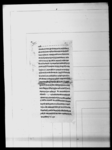An arjī re the emperor's order to destroy a Hindu temple after a Muslim boy was killed (VS 1904)
ID: DNA_0003_0085
Edited and
translated by Rajan Khatiwoda
in collaboration with
Christof Zotter and Rabi Acharya
Created: 2014-12-07;
Last modified: 2018-06-18
For the metadata of the document, click here
The accompanying edition, translation/synopsis and/or commentary are available under the terms of the Creative Commons Attribution-ShareAlike 4.0 International License
Abstract
A Muslim boy was killed by a Hindu and his blood spread over a Hindu deity, whereupon the emperor ordered Muslims to destroy the Hindu deity alongwith the temple. A report about the incident is followed by a request to the addressee for financial assistance.Diplomatic edition
[1r]
1⟪नं2३१८⟫1अर्जी ¯ ¯ ¯ ¯ ¯ ¯ ¯ ¯ ¯ ¯ ¯ ¯ ¯ ¯
2गरीवपर्वरहाललखनऊकादरियाफ्तहुवाकिइसमहीनेमेँकइरइ
3सनेवादशाहकेपासअर्ज़कियाकिएकमुसल्मानकेलडकेको
4किसूहिन्दूनेमारकरउसकाखूनअपनेदेवतापरछिडकाउसपर
5बादशाहनेहुक्मदियाकिउसहिन्दूकेदेवलकोखोदकरउसदेव
6ताकोभंगकरडालोऔरउसमेँजोअसबाबहैउसकोजब्तक
7र्केहजूरमेँहाजिरकरोउसहुक्ममुताविकदेवलकीवर्बादीहुइइस
8हालकोहिन्दूयोँनेदेखकरसमझाकिहिन्दूधर्मछूडता हैउसवक़्त
9हिन्दूलोगइँगरेजकेछावनीमेँगएइसखबरकोबादशाहनेसुन
10करकोतवालकोताकीदकियाकिकोइहिन्दूइँगरेजोँके
11छावनीमेँनजानेपावेँअगरजातेदेखोफौरनउनकोगिरफ्तारकरोज
12बकिकोतवालउनकोधरपकडकर्नेलगेउसवक्ततमामहिन्दू
13लोगलडनेकेमुस्तैदहुएयहफ़सादसाहेबरजीदंडनेसुनकर
14खुदबादशाहकेपासगएऔरउनकोबहुतसमझायाउस वक़्त
15तकरारमौकूफ़हुइलेकिनहिन्दूलोगअभीँतकविगडेहैँआइन्दे
16जोकुछहालहोगाअर्जकरूगाऔरआजरातकोविन्धाच
17लसेसवारी- -१- - यहाँपहुचीलेकिनगर्मीकेसवबसेउनकी
18तवीयतदिकहैइससेमालूमहोताहैकिअवगर्मीकेसववसेवा
19हरतशरीफनलेजायँगेऔरइनदिनौँमैख़र्चवगैरनिहायतदि
20क़रहता हैआगेमेरेहालपरनजरकर्केवकसनाहोगातववडी
21याहोगाऔरआपकेवक्तमेमेरेकोदुसरेकेदरवजेसेअर्जक
22र्नामुसकिलहैरुपयारोजजोहजूरसेमेरेपर्वरिशकेवास्तेहुक्म
23हुवाहैसोनजरवक्सनेसेमेरेकोमिलैगामितीचैत्रशूदी१५
24रोज४समत१९०४शुभः
Translation
[1r]
[NAK manuscript] number 318
O caretaker of the poor! It has been learned regarding the situation in Lucknow that this month several noblemen reported to the Emperor (bādaśāha)1 that a Hindu killed a Muslim boy and sprinkled his blood on his own deity. Thereupon the Emperor ordered: "Demolish that Hindu’s temple, break [the statue of] the deity, confiscate whatever valuables are in it, and present them to us." In accordance with that order, the temple was destroyed. Seeing the situation, the Hindus realized that the Hindu dharma was vanishing. Then the Hindus went to the British cantonment. When the Emperor heard the news, he instructed the chief police officer (kotavāla) [as follows]: "No Hindus should be allowed to go to the English cantonment. If you see [any of them] going [there], arrest them immediately." When the kotavāla started apprehending them, all the Hindus girt themselves up to fight. Hearing of this commotion, the [British] Resident personally went to the Emperor and made appeal to him forcefully [not to proceed]. By that time the wrangling had settled but the Hindus were still angry. I will report to you how the situation shapes up in the future.
Furthermore: -1-2 arrived 3 here tonight from Vindhyācala,4 but because of the hot weather his state of health is poor. Therefore, it is evident that he will not be going out as long as it is hot.
Furthermore: it is very difficult these days [to meet] expenses etc. [If you] consider my situation and and grant [some money], that would be great. And as long as you are there, it is difficult for me to go to somebody else's door. Whatever daily allowance (rūpayā roja) you order for me regarding my concern, my affairs will straighten out through your having considered [the matter] and granted [the sum].
Wednesday, the 15th of the bright fortnight of Caitra in the [Vikrama] era year 1904 (1848 CE). Auspiciousness.

